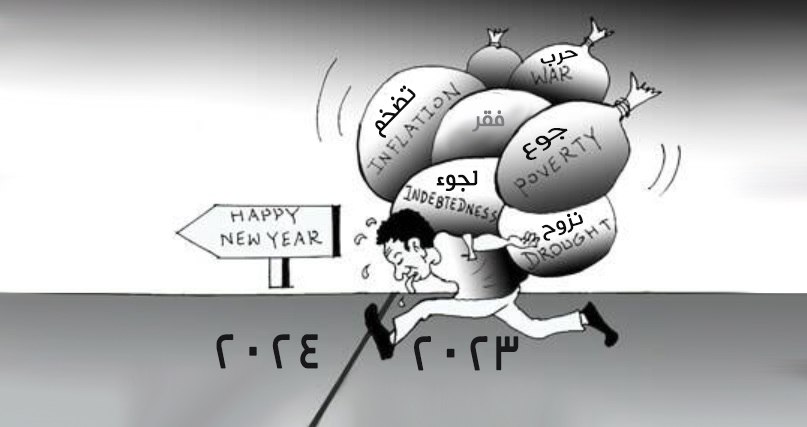
At the end of the Sudanese year, they do not have the luxury of lighting candles
Al-Zain Osman
The number three will turn into four, signaling the end of the year 2023. The world will light its candles in anticipation of the new year, echoing the security phrase "Happy New Year." Unusually, twelve oclock in Khartoum will be midnight in the city that sleeps at the bottom of sorrows, "Wajum." It has no time to know that it is "New Years Eve," a description used by the people of Sudan for the last days of December. Those who stole its tranquility did not leave a candle for it. They made it sleep in the embrace of the Nile and darkness together, sparing it the cost of buying fireworks for this year when they made death a reality for it. The war that does not resemble any other war is the definition that precedes the capital, Mokran Al-Nilein.
From a city inhabited by ghosts, those forced by circumstances to stay in Khartoum amid war struggle to acquire what makes them able to live. Post-April 15 Khartoum does not resemble the Khartoum of past years. In the last hours of 2023, the Sudanese capital does not have the luxury of lighting candles. Those who stole its tranquility did not leave a space for it to celebrate, nor did they leave people in it who could celebrate.
Khartoum cannot repeat what it did last year and in previous years when it launched fireworks. There is no place for fireworks in the time of the reality of war in the war-torn city. People can hardly distinguish between days and dates. All moments of death look alike to them.
The city that most of its residents left due to war will pass an ordinary day. It will miss the hustle of public celebrations. Its main streets will be empty of pedestrians and cars, with the phenomenon of private car looting and considering them war spoils. No one owns a private car anymore. The cars roaming the city now carry fighters with their weapons. With the people of Khartoum absent from their city, most of the New Year celebration squares in the city are now confrontation points between the conflicting parties. This applies to the three capital cities "Khartoum, Omdurman, and Khartoum North." In addition to the difficulty of movement in the city, with bridges closed.
In its ninth month, the war did not suffice to deprive the people of Khartoum alone from celebrating the end of the year. Celebrating is something that will happen in the rest of the Sudanese cities, whether those under the control of the army or those controlled by the Rapid Support Forces, especially since most states have issued governors decisions to declare a state of emergency and curfew starting from eight oclock at night. This applies even to the temporary administrative capital "Port Sudan," whose government imposed a curfew starting at eleven oclock at night. In conclusion, war has forced Sudanese to stay in their homes, just as it deprived Sudanese of celebrating Eid al-Fitr and Eid al-Adha. With the repetition of the same with the December Revolution anniversary, the same war returns to prevent them from celebrating the end of a year they wished not to live through, calling it a "nightmare."
The nightmare of war looming over their chests since mid-April bids Sudanese farewell to their past year without signs of celebrations, the absence of security, coupled with tight financial conditions, distancing them from their homes and places they were accustomed to. Economic circumstances related to a person who has not received a salary for nine months, all factors that make celebrating the end of the year a luxury that the people of Sudan, living in cities under the mercy of bombardment, do not possess. They did not even spare distant villages in the war of chaos and looting together.
And when you ask them how they will celebrate the new year, their collective tongue repeats: nothing calls for celebrating a year. If we had control, we would withdraw it from the agenda. What we desire is for the fires of death to go out, and we return to our lives before the year 2023.

